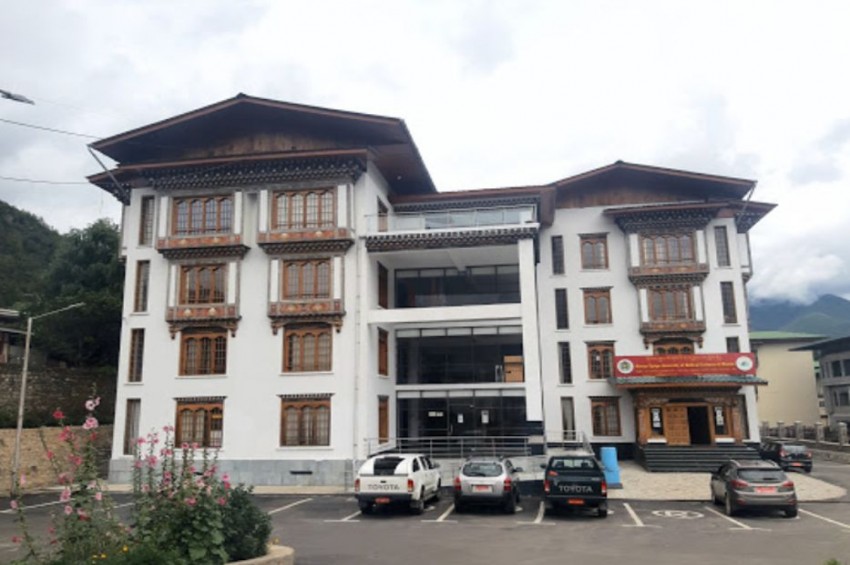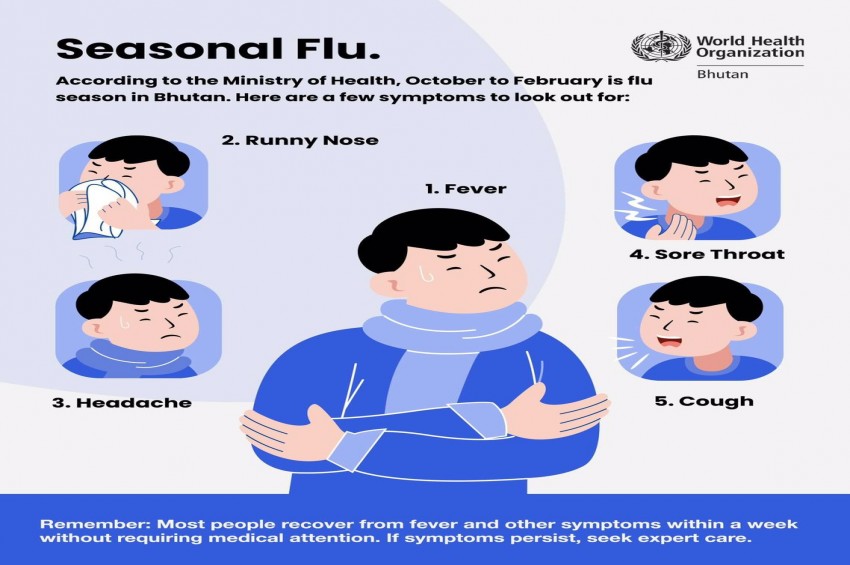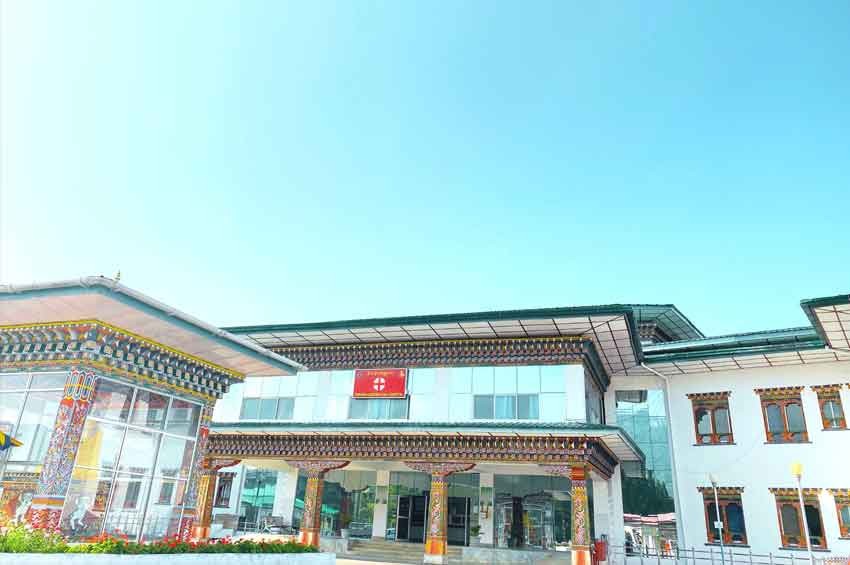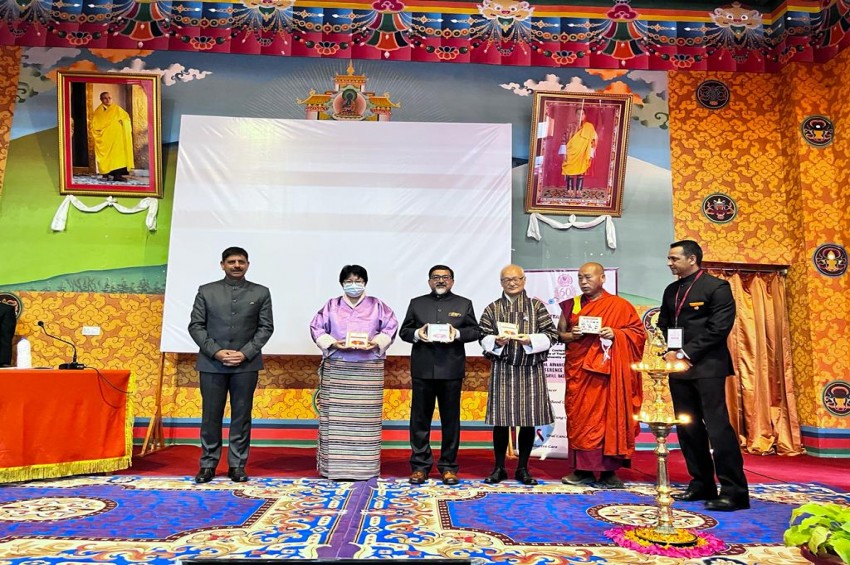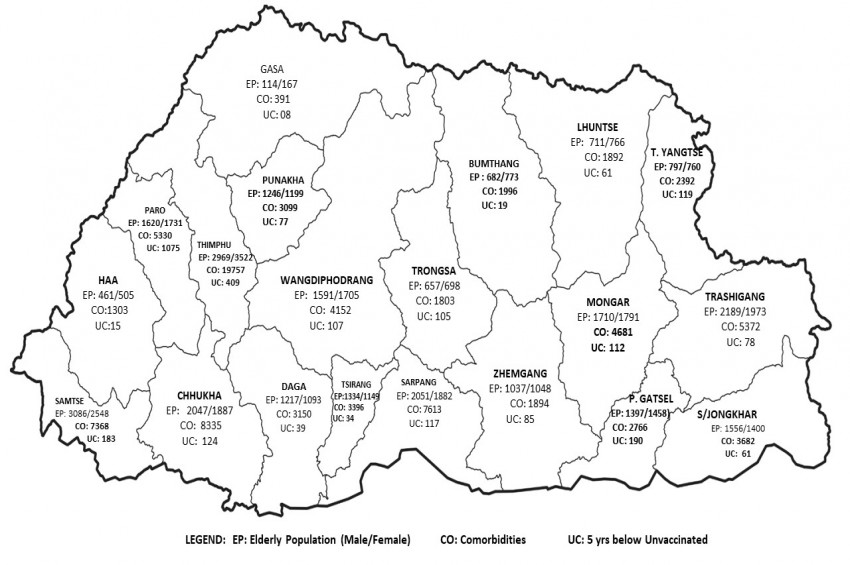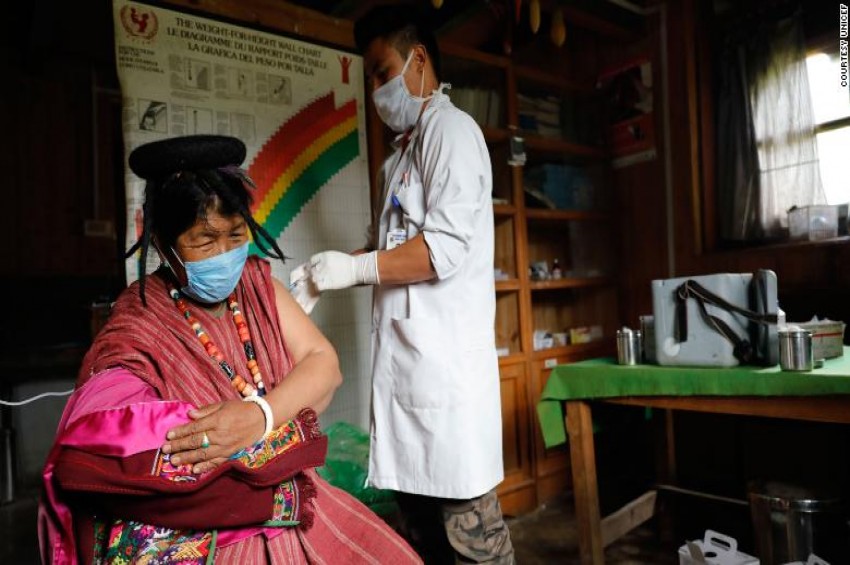Strengthening the medical education through simulation-based training centres
Khesar Gyalpo University of Medical Sciences of Bhutan (KGUMSB) and Japan International Cooperation Agency (JICA) office in Bhutan are implementing a 5-year Technical Cooperation Project (TCP) titled “strengthening the medical education” from August 2020.
The overall goal of the project is enhancing the Quality of medical education provided to health human resources to deliver sustainable health services in the country.
The TCP project recognizes the importance of emergency care and life support as part of its project activities.
With TCP support, the university was able to develop a Simulation Based training centre and developed the National Resuscitation Courses as an integral part of the project purpose.
At this time, KGUMSB and JICA have decided to invite Jeeva Raksha Trust from India to organize Training of Trainers for Emergency Care and Life Support (ECLS) and Basic Care and Life Support (BCLS) to develop a pool of masters’ trainers in the country.
The Jeeva Raksha Trust is a special organization created by Rajiv Gandhi University of
Health Sciences (RGUHS) to roll out ‘Certified Skill Courses’ in Emergency Care and Life
Support equipping doctors, nurses, paramedics and public with necessary skills so as to transform the Emergency Care response system in the state and thus save lives.
KGUMSB is collaborating with Jeeva Raksha in enabling the emergency care capabilities by creating Master Trainers for ECLS and BCLS who would later on comprehensively reach out to every health professional of the country.
This unique program has been implemented with the primary goal of a sustained emergence care capability, lifting medical emergency patient care in Bhutan.
Simulation based training has been successfully integrated worldwide in the aviation industry and nuclear power plants to minimize human errors in high-risk situations.
Simulation is also an important element for improving quality of healthcare and patient safety. There is growing evidence that simulation-based training increases adherence to best practices, improves clinical outcomes, reduces risk of harm and costs associated with care. Simulation provides an interactive, immersive method to enhance or re-create the experiences that occur in the healthcare environment.
Simulation based education in in-service training has first been initiated in 2006 by RMNH program, ministry of health (MoH) as a part of Essential Newborn Care and Emergency Obstetric Care.
First ever formal simulation-based training started in 2012 when National Emergency Education Centre (NEEC) was established in Jigme Dorji Wangchuck National Referral Hospital (JDWNRH) with support from Bhutan Foundation in collaboration with MoH and Phelp’s Emergency Education Program (New York, USA).
Prior to that, some healthcare providers were trained on simulation-based training on ACLS, ATLS, PALS and BLS abroad like the USA and Singapore.
After the establishment of NEEC, instructor courses and provider courses were conducted in 2014 on BLS, ACLS and PALS by the instructors from the Phelp’s center.
Later Bhutan’s own instructors rolled out these programs to the districts. Refresher courses were again done in 2016 for our instructors on BLS, ACLS and PALS through funding from Bhutan Foundation.
Thereafter, the instructors could not carry on the training on a regular basis due to lack of funds.
However, simulation-based training was carried on during the clinical orientation programs for the RCSC selected GMDOs, BSc nurses and Dentists since 2014. It is also being done for the staff of JDWNRH by the emergency department.
Simulation based training was limited to low fidelity simulators at the Faculty of Nursing and Public Health mostly in nursing and midwifery related skills.
Currently, a few lifesaving skills courses have been conducted by JDWNRH, KGUMSB and the MoH such as BLS, ACLS, PALS, NBLS and NALS. Although no formal ATLS courses were conducted, the trauma simulators are being used during trauma course training.
Challenges faced in simulation-based training were Lack of integration of simulation-based education in the curriculum. Moreover, patient safety has been compromised due to limited competencies
Issues related to simulators were that simulators are not easily available and very expensive. And there was no transparency and accountability on what simulators are available and owned by whom.
Lack of ownership, administrative support, maintenance and sub optimal use of simulators were also a problem.
Some issues related to space resulted in simulation labs that do not have facilities to mimic real clinical situations to increase effectiveness of simulation-based education.
Also lack of space to keep mannequins and use them in the patient care setting were difficult.
Issues related to life saving skills courses were limited recurrent budgets available to train healthcare providers. There was no standardized structured uniform resuscitation course in the country.
Copyright issues compromise the scalability of commercially available courses and lack of expertise.
Why does Bhutan need simulation-based training centres?
In the traditional way of teaching-learning, the skills were directly taught and practiced on patients in the hospitals. It is not only unethical to experiment and practice on patients with the risk of causing harm to patients but also risk litigation.
Therefore, training and practicing on simulators before working on real-life patients would help in improving patient safety and quality of care.
Having simulation-based training can standardize the quality of training and put to use the limited resources efficiently and effectively.
Key milestones: 2012: The National Emergency Education Center (NEEC) was established with the support of the Bhutan Foundation in Old Maternity Ward in JDWNRH campus.
In 2014, the instructor courses and provider courses were conducted on BLS, ACLS and PALS by the instructors from the Phelp’s center.
Again in 2014, the clinical orientation programs including simulation-based training for the RCSC selected GMDOs, BSc nurses and Dentists started.
In 2015, Bhutanese instructors rolled out BLS, ACLS and PALS to the districts.
In 2016, refresher courses were again done for our instructors on BLS, ACLS and PALS through funding from Bhutan Foundation.
In 2017, NEEC was shifted to RIHS (Current FNPH) main academic block.
And in 2019, the perinatal skill lab has been initiated with the support of UNICEF.
In 2021, the perinatal skill lab has expanded into National Simulation Lab and Regional Simulation Labs with the support of JICA and named as “Centre for Simulation-Based Training”
Khesar Gyalpo University of Medical Sciences of Bhutan (KGUMSB) and Japan International Cooperation Agency (JICA) office in Bhutan are implementing a 5-year Technical Cooperation Project (TCP) titled “strengthening the medical education” from August 2020.
The overall goal of the project is enhancing the Quality of medical education provided to health human resources to deliver sustainable health services in the country.
The TCP project recognizes the importance of emergency care and life support as part of its project activities.
With TCP support, the university was able to develop a Simulation Based training centre and developed the National Resuscitation Courses as an integral part of the project purpose.
At this time, KGUMSB and JICA have decided to invite Jeeva Raksha Trust from India to organize Training of Trainers for Emergency Care and Life Support (ECLS) and Basic Care and Life Support (BCLS) to develop a pool of masters’ trainers in the country.
The Jeeva Raksha Trust is a special organization created by Rajiv Gandhi University of
Health Sciences (RGUHS) to roll out ‘Certified Skill Courses’ in Emergency Care and Life
Support equipping doctors, nurses, paramedics and public with necessary skills so as to transform the Emergency Care response system in the state and thus save lives.
KGUMSB is collaborating with Jeeva Raksha in enabling the emergency care capabilities by creating Master Trainers for ECLS and BCLS who would later on comprehensively reach out to every health professional of the country.
This unique program has been implemented with the primary goal of a sustained emergence care capability, lifting medical emergency patient care in Bhutan.
Simulation based training has been successfully integrated worldwide in the aviation industry and nuclear power plants to minimize human errors in high-risk situations.
Simulation is also an important element for improving quality of healthcare and patient safety. There is growing evidence that simulation-based training increases adherence to best practices, improves clinical outcomes, reduces risk of harm and costs associated with care. Simulation provides an interactive, immersive method to enhance or re-create the experiences that occur in the healthcare environment.
Simulation based education in in-service training has first been initiated in 2006 by RMNH program, ministry of health (MoH) as a part of Essential Newborn Care and Emergency Obstetric Care.
First ever formal simulation-based training started in 2012 when National Emergency Education Centre (NEEC) was established in Jigme Dorji Wangchuck National Referral Hospital (JDWNRH) with support from Bhutan Foundation in collaboration with MoH and Phelp’s Emergency Education Program (New York, USA).
Prior to that, some healthcare providers were trained on simulation-based training on ACLS, ATLS, PALS and BLS abroad like the USA and Singapore.
After the establishment of NEEC, instructor courses and provider courses were conducted in 2014 on BLS, ACLS and PALS by the instructors from the Phelp’s center.
Later Bhutan’s own instructors rolled out these programs to the districts. Refresher courses were again done in 2016 for our instructors on BLS, ACLS and PALS through funding from Bhutan Foundation.
Thereafter, the instructors could not carry on the training on a regular basis due to lack of funds.
However, simulation-based training was carried on during the clinical orientation programs for the RCSC selected GMDOs, BSc nurses and Dentists since 2014. It is also being done for the staff of JDWNRH by the emergency department.
Simulation based training was limited to low fidelity simulators at the Faculty of Nursing and Public Health mostly in nursing and midwifery related skills.
Currently, a few lifesaving skills courses have been conducted by JDWNRH, KGUMSB and the MoH such as BLS, ACLS, PALS, NBLS and NALS. Although no formal ATLS courses were conducted, the trauma simulators are being used during trauma course training.
Challenges faced in simulation-based training were Lack of integration of simulation-based education in the curriculum. Moreover, patient safety has been compromised due to limited competencies
Issues related to simulators were that simulators are not easily available and very expensive. And there was no transparency and accountability on what simulators are available and owned by whom.
Lack of ownership, administrative support, maintenance and sub optimal use of simulators were also a problem.
Some issues related to space resulted in simulation labs that do not have facilities to mimic real clinical situations to increase effectiveness of simulation-based education.
Also lack of space to keep mannequins and use them in the patient care setting were difficult.
Issues related to life saving skills courses were limited recurrent budgets available to train healthcare providers. There was no standardized structured uniform resuscitation course in the country.
Copyright issues compromise the scalability of commercially available courses and lack of expertise.
Why does Bhutan need simulation-based training centres?
In the traditional way of teaching-learning, the skills were directly taught and practiced on patients in the hospitals. It is not only unethical to experiment and practice on patients with the risk of causing harm to patients but also risk litigation.
Therefore, training and practicing on simulators before working on real-life patients would help in improving patient safety and quality of care.
Having simulation-based training can standardize the quality of training and put to use the limited resources efficiently and effectively.
Key milestones: 2012: The National Emergency Education Center (NEEC) was established with the support of the Bhutan Foundation in Old Maternity Ward in JDWNRH campus.
In 2014, the instructor courses and provider courses were conducted on BLS, ACLS and PALS by the instructors from the Phelp’s center.
Again in 2014, the clinical orientation programs including simulation-based training for the RCSC selected GMDOs, BSc nurses and Dentists started.
In 2015, Bhutanese instructors rolled out BLS, ACLS and PALS to the districts.
In 2016, refresher courses were again done for our instructors on BLS, ACLS and PALS through funding from Bhutan Foundation.
In 2017, NEEC was shifted to RIHS (Current FNPH) main academic block.
And in 2019, the perinatal skill lab has been initiated with the support of UNICEF.
In 2021, the perinatal skill lab has expanded into National Simulation Lab and Regional Simulation Labs with the support of JICA and named as “Centre for Simulation-Based Training”

